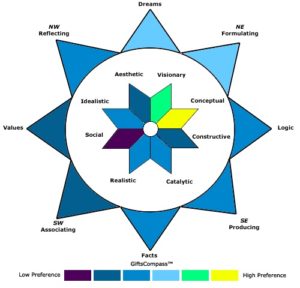“Often he is gauche in his behavior, painfully anxious to escape notice, or else remarkably unconcerned and childishly naive.”– C.G. Jung
We know much about the types as they normally function, but how they function as oppositional shadow types is not as well known or understood. A small study group (Gunilla Midbøe, Vanessa Prins, Barbara Helen Miller and I) meet regularly online to consider the types in the shadow position. This series of articles will include some of our insights and observations. We begin with the most gregarious of the psychological types: Extraverted Feeling.
Social Feeling (EF)
We could call this role of feeling, social feeling to distinguish it from its introverted sister, idealistic feeling. Extraverted feeling orients quickly to outer events, especially as they are related to social norms–the associations, social standards, styles, and values encountered in the world. The aim of extraverted feeling is not to take a stand for new idealistic values, but to affirm the traditional values of others and sustain them.
“This kind of feeling is very largely responsible for the fact that so many people flock to the theatre or to concerts, or go to church, and do so moreover with their feelings correctly adjusted.” (CW 6, par. 596)
 Extraverted Feeling in the Shadow
Extraverted Feeling in the Shadow
Everything we could say about well adapted, mature, politically correct, highly gregarious extraverted feeling becomes primitive, immature and undeveloped in the shadow. Much less accessible to consciousness, the voice from the unconscious is like a softly spoken, insecure child experimenting with new social relationships.
She is outgoing but timid, unsure of herself and naive. She means well, but she does not have the skills yet to be gregarious in a mature way. She will serve as the opposition to whatever type has taken the lead in consciousness but she will be a weak counterbalance.
She will urge the individual to remember social convention, and her urgings will be largely ignored. Her voice is not strong or convincing yet. She wants to be a helpful guide in social circumstances, but the more “adult” lead types tend to ignore her.
Consequently, the individual with extraverted feeling in the shadow will tend to make reckless social evaluations, uninformed by the empathy of this suppressed voice. The person will often be quite awkward or nervous, unsure of how to behave with others. Small talk and casual conversation can be difficult.
“Often he is gauche in his behavior, painfully anxious to escape notice, or else remarkably unconcerned and childishly naive.” (CW 6, par. 635)
People disposed to introverted thinking are often those with extraverted feeling in the shadow, for the types are opposites. Films like “A Beautiful Mind,” about the American mathematician John Nash, or “The Imagination Game” about the British mathematician Alan Turing, depict the feckless social skills of these men with their one-sided orientation to introverted thinking.
“To outsiders he seems prickly, unapproachable, and arrogant, and sometimes soured as a result of his antisocial prejudices.” (CW 6, par. 635)

